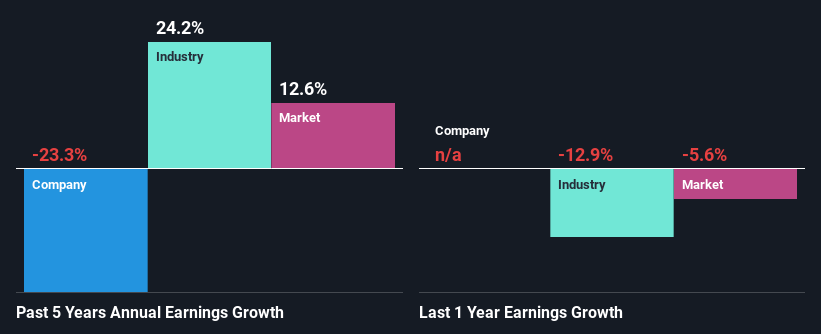Is Ajinomoto (Malaysia) Berhad's (KLSE:AJI) Recent Stock Performance Influenced By Its Financials In Any Way?
Most readers would already know that Ajinomoto (Malaysia) Berhad's (KLSE:AJI) stock increased by 4.1% over the past three months. As most would know, long-term fundamentals have a strong correlation with market price movements, so we decided to look at the company's key financial indicators today to determine if they have any role to play in the recent price movement. Specifically, we decided to study Ajinomoto (Malaysia) Berhad's ROE in this article.
ROE or return on equity is a useful tool to assess how effectively a company can generate returns on the investment it received from its shareholders. Put another way, it reveals the company's success at turning shareholder investments into profits.
View our latest analysis for Ajinomoto (Malaysia) Berhad
How Do You Calculate Return On Equity?
ROE can be calculated by using the formula:
Return on Equity = Net Profit (from continuing operations) ÷ Shareholders' Equity
So, based on the above formula, the ROE for Ajinomoto (Malaysia) Berhad is:
8.8% = RM48m ÷ RM546m (Based on the trailing twelve months to September 2023).
The 'return' is the profit over the last twelve months. That means that for every MYR1 worth of shareholders' equity, the company generated MYR0.09 in profit.
What Is The Relationship Between ROE And Earnings Growth?
Thus far, we have learned that ROE measures how efficiently a company is generating its profits. Depending on how much of these profits the company reinvests or "retains", and how effectively it does so, we are then able to assess a company’s earnings growth potential. Generally speaking, other things being equal, firms with a high return on equity and profit retention, have a higher growth rate than firms that don’t share these attributes.
Ajinomoto (Malaysia) Berhad's Earnings Growth And 8.8% ROE
At first glance, Ajinomoto (Malaysia) Berhad's ROE doesn't look very promising. Although a closer study shows that the company's ROE is higher than the industry average of 6.8% which we definitely can't overlook. But seeing Ajinomoto (Malaysia) Berhad's five year net income decline of 23% over the past five years, we might rethink that. Bear in mind, the company does have a slightly low ROE. It is just that the industry ROE is lower. So that could be one of the factors that are causing earnings growth to shrink.
So, as a next step, we compared Ajinomoto (Malaysia) Berhad's performance against the industry and were disappointed to discover that while the company has been shrinking its earnings, the industry has been growing its earnings at a rate of 24% over the last few years.

Earnings growth is a huge factor in stock valuation. What investors need to determine next is if the expected earnings growth, or the lack of it, is already built into the share price. By doing so, they will have an idea if the stock is headed into clear blue waters or if swampy waters await. One good indicator of expected earnings growth is the P/E ratio which determines the price the market is willing to pay for a stock based on its earnings prospects. So, you may want to check if Ajinomoto (Malaysia) Berhad is trading on a high P/E or a low P/E, relative to its industry.
Is Ajinomoto (Malaysia) Berhad Efficiently Re-investing Its Profits?
Despite having a normal three-year median payout ratio of 50% (where it is retaining 50% of its profits), Ajinomoto (Malaysia) Berhad has seen a decline in earnings as we saw above. So there might be other factors at play here which could potentially be hampering growth. For example, the business has faced some headwinds.
Additionally, Ajinomoto (Malaysia) Berhad has paid dividends over a period of at least ten years, which means that the company's management is determined to pay dividends even if it means little to no earnings growth.
Conclusion
Overall, we feel that Ajinomoto (Malaysia) Berhad certainly does have some positive factors to consider. Yet, the low earnings growth is a bit concerning, especially given that the company has a respectable rate of return and is reinvesting a huge portion of its profits. By the looks of it, there could be some other factors, not necessarily in control of the business, that's preventing growth. While we won't completely dismiss the company, what we would do, is try to ascertain how risky the business is to make a more informed decision around the company. Our risks dashboard will have the 1 risk we have identified for Ajinomoto (Malaysia) Berhad.
Have feedback on this article? Concerned about the content? Get in touch with us directly. Alternatively, email editorial-team (at) simplywallst.com.
This article by Simply Wall St is general in nature. We provide commentary based on historical data and analyst forecasts only using an unbiased methodology and our articles are not intended to be financial advice. It does not constitute a recommendation to buy or sell any stock, and does not take account of your objectives, or your financial situation. We aim to bring you long-term focused analysis driven by fundamental data. Note that our analysis may not factor in the latest price-sensitive company announcements or qualitative material. Simply Wall St has no position in any stocks mentioned.
